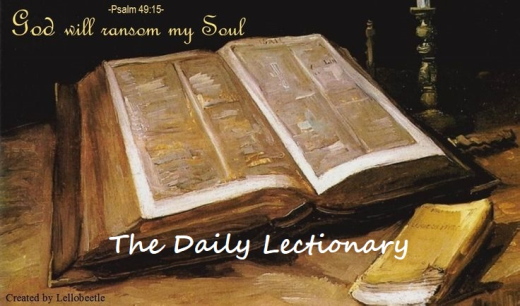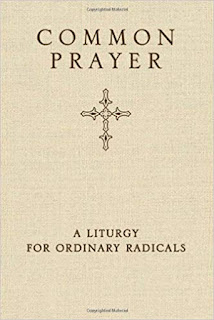The Daily Lectionary
MONDAY, July 27, 2020
Psalm 65:8-13; Genesis 30:25-36; James 3:13-18
(Revised Common Lectionary Year A)
Meadows clothed with flocks
8 The whole earth is filled with awe at your wonders;
where morning dawns, where evening fades,
you call forth songs of joy.
9 You care for the land and water it;
you enrich it abundantly.
The streams of God are filled with water
to provide the people with grain,
for so you have ordained it.
10 You drench its furrows and level its ridges;
you soften it with showers and bless its crops.
11 You crown the year with your bounty,
and your carts overflow with abundance.
12 The grasslands of the wilderness overflow;
the hills are clothed with gladness.
13 The meadows are covered with flocks
and the valleys are mantled with grain;
they shout for joy and sing.
Jacob and Laban argue
30:25 After Rachel gave birth to Joseph, Jacob said to Laban, “Send me on my way so I can go back to my own homeland. 26 Give me my wives and children, for whom I have served you, and I will be on my way. You know how much work I’ve done for you.”
27 But Laban said to him, “If I have found favor in your eyes, please stay. I have learned by divination that the Lord has blessed me because of you.” 28 He added, “Name your wages, and I will pay them.”
29 Jacob said to him, “You know how I have worked for you and how your livestock has fared under my care. 30 The little you had before I came has increased greatly, and the Lord has blessed you wherever I have been. But now, when may I do something for my own household?”
31 “What shall I give you?” he asked.
“Don’t give me anything,” Jacob replied. “But if you will do this one thing for me, I will go on tending your flocks and watching over them: 32 Let me go through all your flocks today and remove from them every speckled or spotted sheep, every dark-colored lamb and every spotted or speckled goat. They will be my wages. 33 And my honesty will testify for me in the future, whenever you check on the wages you have paid me. Any goat in my possession that is not speckled or spotted, or any lamb that is not dark-colored, will be considered stolen.”
34 “Agreed,” said Laban. “Let it be as you have said.” 35 That same day he removed all the male goats that were streaked or spotted, and all the speckled or spotted female goats (all that had white on them) and all the dark-colored lambs, and he placed them in the care of his sons. 36 Then he put a three-day journey between himself and Jacob, while Jacob continued to tend the rest of Laban’s flocks.
Two kinds of wisdom
3:13 Who is wise and understanding among you? Let them show it by their good life, by deeds done in the humility that comes from wisdom. 14 But if you harbor bitter envy and selfish ambition in your hearts, do not boast about it or deny the truth. 15 Such “wisdom” does not come down from heaven but is earthly, unspiritual, demonic. 16 For where you have envy and selfish ambition, there you find disorder and every evil practice.
17 But the wisdom that comes from heaven is first of all pure; then peace-loving, considerate, submissive, full of mercy and good fruit, impartial and sincere. 18 Peacemakers who sow in peace reap a harvest of righteousness.
Optional parts of the readings are set off in [square brackets.]
The Bible texts of the Old Testament, Epistle, and Gospel lessons are from The Holy Bible, New International Version®, NIV® Copyright ©1973, 1978, 1984, 2011 by Biblica, Inc.® Used by permission. All rights reserved worldwide.
The Daily Lectionary is a three-year cyclical lectionary. We are currently in Year A. Beginning with the first Sunday of Advent in 2020, we will be in Year B. The year which ended at Advent 2019 was Year C. These readings complement the Sunday and festival readings: Thursday through Saturday readings help prepare the reader for the Sunday ahead; Monday through Wednesday readings help the reader reflect and digest what they heard in worship. Revised Common Lectionary Daily Readings, copyright © 2005 Consultation on Common Texts. www.commontexts.org
The Daily Lectionary for MONDAY, July 27, 2020
Psalm 65:8-13; Genesis 30:25-36; James 3:13-18









